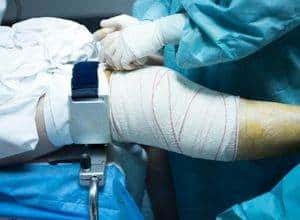
If you're experiencing debilitating pain in your knee due to a serious injury or medical condition, the best knee reconstruction surgeon can help. Knee replacement, commonly called knee arthroplasty or complete knee replacement, is a surgical operation used to resurface an arthritis-damaged knee. Metal and plastic components, as well as the kneecap, are used to cap the ends of the bones that comprise the knee joint. Someone with severe arthritis or a serious knee injury may benefit from this procedure.
The knee joint can be affected by several forms of arthritis. Osteoarthritis, a degenerative joint condition mostly affecting middle-aged and older individuals, can destroy joint cartilage and adjacent knee bone. Rheumatoid arthritis causes synovial membrane inflammation and excess synovial fluid and can cause discomfort and stiffness. Traumatic arthritis, or arthritis caused by accident, can destroy the cartilage in the knee.
The purpose of knee replacement or reconstruction surgery is to resurface damaged areas of the knee joint and reduce knee discomfort that cannot be managed with conventional therapies.

Joints are the points wherein two or more bones come together. The majority of joints are movable, which allows the bones to move. The knee is two long leg bones kept together by muscles, ligaments, and tendons. A layer of cartilage covers each bone end, absorbing shock and protecting the knee.
The quadriceps muscles (seen on the front of your thighs), which straighten your legs, and the hamstring muscles (placed on the back of the thighs), which bend your leg at the knee, are both engaged in the knee.
Tendons are thick connective tissue strands that link muscles and bones. Ligaments are elastic tissue bands that link bones. Some knee ligaments offer joint stability and protection, while others limit the tibia's forward and backward mobility (shin bone)
The knee is made up of the following parts:
Knee replacement surgery is a treatment for knee pain and impairment. Osteoarthritis is the most common condition that necessitates knee replacement surgery.
The deterioration of joint cartilage is the hallmark of osteoarthritis. Cartilage and bone damage restrict mobility and may cause discomfort. People with serious degenerative joint disease may be unable to perform normal activities that require knee bending, such as walking or climbing stairs, due to pain. Because the joint is unstable, the knee may swell or "give way."
Other types of arthritis, like rheumatoid arthritis and arthritis caused by a knee injury, can also cause knee joint degeneration. Furthermore, fractures, cartilage, and torn ligaments can result in irreversible knee joint damage.
If medical treatments are ineffective, knee replacement surgery may be an option. Some examples of medical treatments for degenerative joint disease include, but are not limited to:
• Anti-inflammatory drugs
• Chondroitin sulfate and glucosamine
• Pain relievers
• Restricting painful activities
• Walking assistive devices
• Physiotherapy
• Cortisone injections into the knee joint
• Viscosupplementation injections (to add lubrication into your joint to make joint movement less painful)
There might be other reasons for your doctor to recommend knee replacement surgery.
Surgery is a last resort for numerous patients. In most cases, the best knee reconstruction surgeon would try more conservative treatments before recommending joint surgery, including knee replacement. Conservative treatments indicate treatments that don't use surgery. These include physical therapy, exercise, medications, injections, or non-surgical procedures.

Some best knee reconstruction surgeons also suggest that patients shed pounds before considering knee replacement or reconstruction surgery. Losing weight could often improve knee pain.
But if you have these symptoms, you might want to consider a more aggressive procedure: knee replacement surgery.
If you've tried physical therapy, exercise, and pain medication, but your pain isn't improving, it may be time to consider knee replacement surgery. After knee replacement surgery, the pain goes away for as many as 90 to 95 percent of younger patients.
If your arthritis makes it difficult for you to sleep, walk, and go to work, this might be a sign you need to go to the best knee reconstruction surgeon and consider knee replacement surgery.
Do you have a stiff, painful, swollen knee? Total knee replacement surgery done by the best knee reconstruction surgeon eliminates much of the damaged, inflamed tissue inside the knee that causes stiffness and swelling.
Surgery may be a good option if your leg is deformed due to an injury or if you were born with a deformity. Knee replacement surgery could repair deformed knee joints and help them normally work again.
Most knee pain worsens when you use your knee while running, walking, or exercising. But if your knee hurts even when you are not using it, you might need surgery to treat moderate or severe pain.

During knee replacement surgery, the best knee reconstruction surgeon would remove all or a part of the knee joint and replace damaged portions with an artificial joint. This artificial joint could correct your leg if it bows in or out.
Artificial knee joints could last between 15 and 25 years. If you love skiing, hiking, or running but the knee pain makes it hard to do those activities, knee replacement surgery may be a great option.
For 9 out of 10 individuals, artificial knee joints still work well 20 years after surgery. The age and physical activity level may affect how well the artificial knee joint works eventually. For instance, artificial joints often last longer for older, less active individuals. But overall, artificial joints provide long-term improvement.
Choosing the best knee reconstruction surgeon is essential to ensure your surgery is successful. A knee replacement is an opportunity to reclaim your active lifestyle, so selecting a quality surgeon experienced with this procedure is crucial. Not only do you want an orthopedic surgeon who has a history of successful knee replacements, but also someone you feel comfortable with asking questions and voicing concerns along the way. Here are some guidelines to observe when finding the best knee reconstruction surgeon.
It's possible to find a board-certified knee replacement surgeon by doing some research online. Several medical associations, like the American Medical Association and the American Academy of Orthopaedic Surgeons, offer lists of surgeons who are qualified.
While it's okay to begin your search for the best knee reconstruction surgeon online, referrals from an individual in the medical field are an excellent resource. Your primary care physician may have a list of experienced orthopedic surgeons who provide knee replacements in the area, or your physical therapist might be able to recommend the best knee reconstruction surgeon with a history of successful outcomes.
As you consider orthopedic surgeons, verify with your insurance provider to ensure your care plan covers the surgeons you're considering. If you choose a surgeon your provider doesn't cover; you could pay a significant out-of-pocket amount for your surgery.
Please speak with your friends, family, and colleagues who have previously undergone knee replacement surgery about their surgeon and experience. They may be able to provide insight and offer suggestions for the best knee reconstruction surgeon.

It's always great to learn more about what other patients have to say about the orthopedic surgeon, and this can give you a closer look at how the medical practice is managed. Reviews from previous patients can help you learn more about experiences with office staff, scheduling, wait times, trust in the physician, and how well the surgeon answers any patient questions.
Reviewing the surgeon's background is essential, and you should look at the surgeon's credentials, education, training, and degrees. Make sure the surgeon is board-certified by a credible association, such as the American Association of Orthopedic Surgeons. You will also want to check to see if any malpractice claims or disciplinary actions are there in the surgeon's past. Beyond medical school and training hospitals, look for surgeons who have used continuing education to expand their knowledge of new devices, technologies, and cutting-edge surgical approaches.
Before you meet with the best knee reconstruction surgeon you're considering for your knee replacement surgery, think about the questions you may have about the physician, his experience, your surgical options, and the procedure. Write these questions down so you remember them when you meet face-to-face. A good surgeon will be happy to spend time with you answering all of your questions and concerns so you are comfortable with them and the procedure.
Schedule a consultation with the orthopedic surgeons you're considering. The consultation is the time to talk to them regarding your specific situation, ask questions you have for them, and get their opinion about your case. It's a good idea to talk to the surgeon about their experience with similar cases, their knee replacement success rate, and where the surgery will be performed. Please pay attention to the surgeon's bedside manner and whether they spend enough time with you answering your questions. This consultation aims to help you decide if it's the right surgeon for your knee replacement surgery.
A great surgeon won't have a problem with you getting a second opinion, and they'll even be happy to talk to you about that opinion. If you get a second opinion to put your mind at ease, choosing another orthopedic surgeon from a different hospital or practice is a good idea.
In the end, trust your instincts when making the final decision. Take into account your research, referrals, and consultations. Choose the surgeon you feel comfortable with and confident in their abilities.